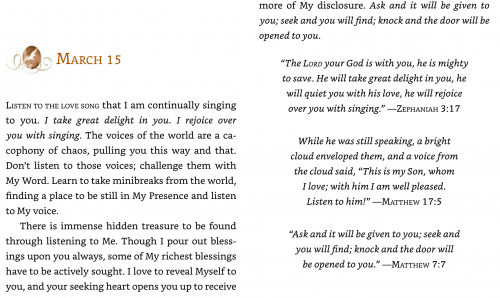Love, which might be called the attraction of all things toward all things, is a universal language and underlying energy that keeps showing itself despite our best efforts to resist it. It is so simple that it is hard to teach in words, yet we all know positive flow when we sense it, and we all know resistance and coldness when we feel it.
When we are truly “in love,” we move out of our small, individual selves to unite with another, whether in companionship, simple friendship, marriage, or any other trustful relationship. Have you ever deliberately befriended a person standing alone at a party? Perhaps someone who was in no way attractive to you, or with whom you shared no common interests? That would be a small but real example of divine love flowing. Don’t dismiss it as insignificant. That is how the flow starts, even if the encounter doesn’t change anyone’s life on the spot. To move beyond our small-minded uniformity, we have to extend ourselves outward, which our egos always find to be a threat, because it means giving up our separation, superiority, and control. Animals can do the same thing for our souls if we will allow it, sometimes better than people.
Men seem to have an especially difficult time at this. I have had the pleasure of presiding at many weddings over the years. Three different times, as I prepared the couple to exchange their vows, the groom actually fainted and fell to the ground. But I have never seen the bride faint. To the well-protected and boundaried male ego, there are few greater threats than the words “till death do us part.” (I am sure women have their own blockages, but the commitment to love doesn’t seem to be one of the major ones for the vast majority of women.)
Love is a paradox. It often involves making a clear decision; but at its heart, it is not a matter of mind or willpower but a flow of energy willingly allowed and exchanged, without requiring payment in return. Divine love is, of course, the template and model for such human love, and yet human love is the necessary school for any encounter with divine love. If we’ve never experienced human love—to the point of sacrifice and forgiveness and generosity—it will be very hard for us to access, imagine, or even experience God’s kind of love. Conversely, if we have never let God love us in the deep and subtle ways that God does, we will not know how to love another human in the deepest ways of which we are capable.
Love is constantly creating future possibilities for the good of all concerned—even, and especially, when things go wrong. Love allows and accommodates everything in human experience, both the good and the bad, and nothing else can really do this. Nothing.
Stages of Growth in Love
We’re told by developmental psychologists that there’s a staging in our growth in love. We have to start with self-love and respecting the self. If we don’t respect ourselves, we won’t know how to respect anybody else.
Then God moves us to group love, family love, which is basically the love of people who are connected to us or who are like us. A lot of people don’t even get there. They don’t know how to love their family or those close to them or those in their group.
From there, God moves us to the third level, which is universal love; I’m afraid a much smaller number of people get to this place. As we see in politics, in our country, and throughout the world, at best most people just get to the second stage of knowing how to love people who are like them: their race, their nationality, their religion, their political party. When we stay at this second stage of group love, we clearly don’t create a healthy society. We see this in the rise of white nationalism and the violence at the U.S. Capitol that took place earlier this year. Many of us who identify as white in the United States are just coming to understand that it was this second level of exclusive love for our own group that was the foundation for most of the oppressive systems of our nation.
In Acts 10 we see how even the so-called first pope, Peter, had to be taught by the Holy Spirit how to grow in love. Peter was at the stage of group love, believing that God only loved the Jewish people. And then this strange thing happened where the Holy Spirit fell upon Gentiles! Peter looked around and said, “Oh my gosh! God seems to be for everybody and not just for the Jewish people!” He understood that it was okay to include Gentiles into what we eventually called the church. In spite of this, most of church history has not really imitated Peter’s insight. We pulled back into group think and group love.
Peter said, “In truth, I see that God shows no partiality. In any country, whoever fears God and acts uprightly is acceptable” (Acts 10:34–35). At that moment he became both a Jewish and Christian heretic! Peter himself began to recognize that God works with all people of goodwill—not just people in his group. But he had to be pushed there. Little by little, God leads him to universal love.
